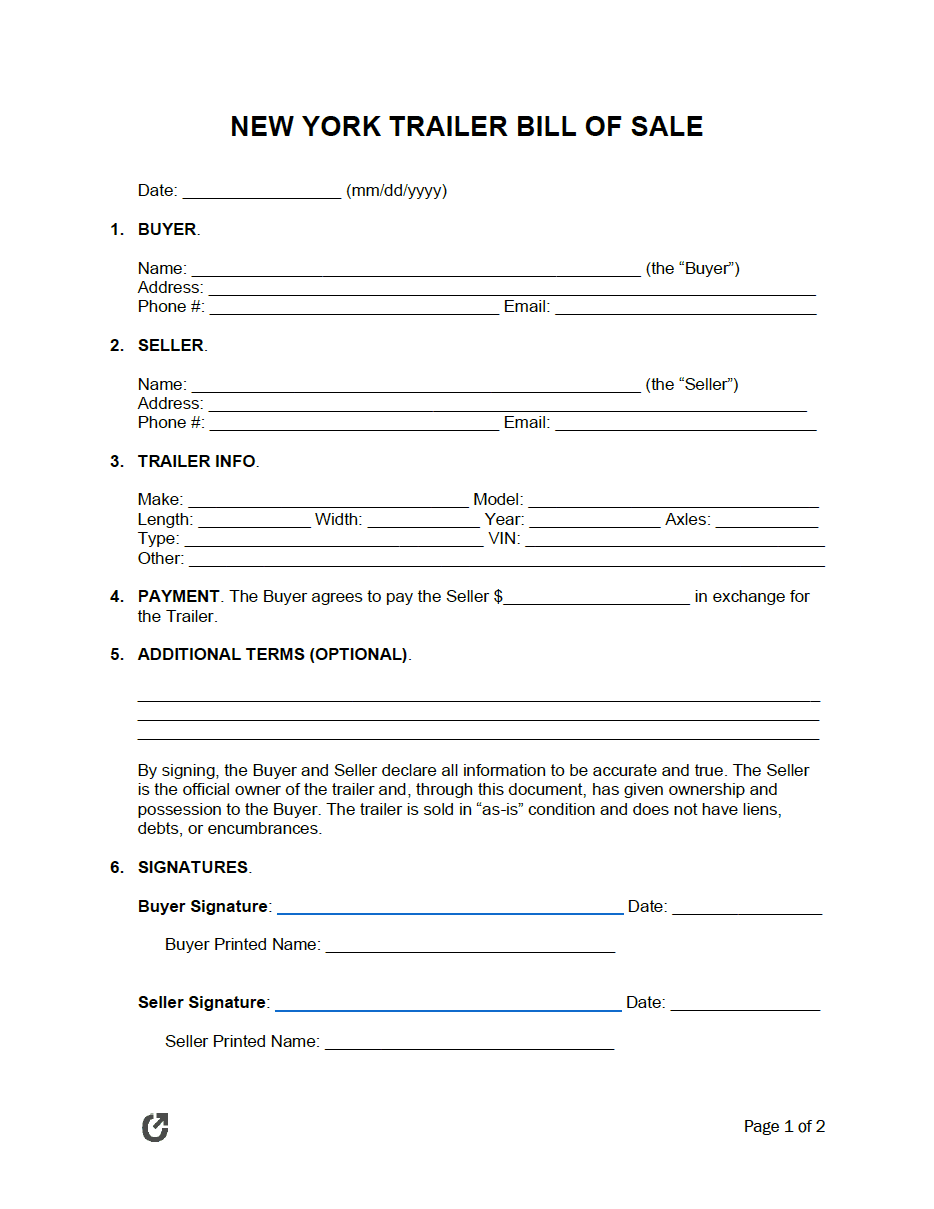New York Trailer Bill of Sale Form
A New York trailer bill of sale form aids buyers and sellers in transferring ownership. It establishes proof of the sale and outlines the obligations of both parties involved, therefore, serving as a contract. Furthermore, the document legally protects each individual if a conflict occurs, such as a breach in the agreement. It also names the sale terms, including the sold items, purchase price, and applicable taxes or fees.
|
What is a New York Trailer Bill of Sale?
A New York bill of sale relieves the seller from ownership, thereby giving possession to the buyer. The form must include the details of both parties, including their names, addresses, and contact information, as well as a description of the trailer, its make, model, year, and condition. Both parties must also list the purchase price and payment terms (if applicable).
The bill of sale is not a title but a document outlining the ownership transfer. However, the two (2) forms often complement one another, with a bill of sale allowing an individual to obtain a title from the Department of Motor Vehicles (DMV).
How to Register a Trailer (4 Steps)
Trailers, unless specifically exempt, must have a New York registration if operating on public roadways. They must obtain a title if it weighs 999 pounds or more or has the model year 1973 or newer. Owners must bring the required paperwork to their local Department of Motor Vehicles (DMV) office for documentation.
Step 1 – Safety Inspection
All trailers must pass an annual safety inspection to remain compliant with state regulations. An inspector from a DMV-licensed inspection station must conduct the review, which requires an in-depth examination of the rig’s components. If it passes, the inspector provides a sticker that the owner must display in the vehicle that tows the trailer. Homemade trailers require a more comprehensive inspection by the DMV to verify their safety.
Step 2 – Title
Residents owning a trailer that weighs over 999 pounds or has the model year 1973 or newer must title it. Trailers under 999 pounds or a model year older than 1973 do not receive a title. Instead, they obtain a transferable registration to prove ownership. Homemade trailers have a different titling process; the New York DMV has outlined the requirements in Form VS-105.
Step 3 – Registration
While most trailers need registration, some do not. The state lists the units that do not need a tag in Form MV-274. Depending on the owner’s situation, they may or may not require specific paperwork. Therefore, the DMV has provided residents with a document guide to help registrars determine the forms they need to bring to the appointment.
For example, registrars must provide proof of ownership, including the original or certified copy of the New York title (i.e., not a photocopy). Acceptable ownership proof from another state also qualifies. Regardless of the circumstances, individuals must submit a completed and signed bill of sale and title (or transferable registration for applicable trailers). Additionally, they must pay annual costs, license plate fees, and taxes.
Once approved, the applicant receives a license plate and a sticker for the registration duration. The owner must replace the sticker during each renewal period. Furthermore, the state does not require insurance for personal trailers; however, commercial rigs must have a policy. Homemade trailers have different registration requirements, which the DMV lists in Form VS-105.
Step 4 – Renew
Trailers registered in New York must have an annual renewal. Re-application must occur each year on or before December 31st. Owners who fail to renew their registration before the expiration date must register again as if it is an initial registration. Therefore, residents should renew their registration on time to avoid extra paperwork and fees.
